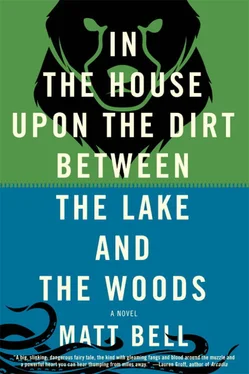And in this room, somehow a baby rabbit, alive, shaking in its fur. It had perhaps come into the deep house during the firestorm above, and now it was near death, with no mother to care for it and no food to find. I was hungry too, and just as lonely, and as I picked up the trembling bunny, I wondered if I had it in me to end early one of this world’s last things, so that I might go on a little longer.
I wondered, and as I wondered I stroked away the rabbit’s shivers, and then I wondered no more.
And in the next deepest room, only ash.
And in the room after that, only more of the same.
And then ash in the next room and in the next room and in the next, all rooms filled with ash and smoke-marred stones still radiating heat or else steaming with water falling through cracked ceilings, through ruptured floors, and throughout that descent the fingerling kept silent his counsel, spent his energies tormenting my body instead of my mind, seizing new stations as I slept in slanted doorways and damp hallways. Then visions of battle all night. Then one morning waking to find my right leg paralyzed straight, the muscles needed to flex it away from its numb position unresponsive even as I felt some ineffective ghost kicking, some shade of the right movement. As I kneaded the muscles and cursed my stubborn son, I felt the silent smirk of his faceless form move, and I stopped my massaging to punch his shapes, not caring that I would only bruise the surface of my stomach and thighs, never harming his holdings beneath.
Let my leg go or do not, I said. I will go on no matter what you do, no matter how it might hurt.
The fingerling did not respond, only let me struggle, believing he could convince me to abandon my last charge, the foundling’s body. But I would not and said as much: If I could not have carried the foundling, then I would have dragged him in his sheets, would have crawled the burned wreckage to search out enough wood to make a sledge on which to haul him down the stairs. I sat on the ground, driving my thumbs through my thick trousers, the spotted skin beneath, rubbing the prickling pain from my muscles, and as I fought nerve by nerve against the fingerling he bragged again about how he would one day take control, and that once he did my mind would be reduced to his former role, a prisoner pushed down, a belly-holed secret, wished forgotten. He would take my body and with it he would live his own life, in the house or on the dirt, among the trees of the woods or under the waters of the lake.
I had been given so many new bodies, he said, and one day he planned to rule them all.
MEMORY AS SADNESS DISCARDED, DENIED:To pretend to be unaffected by the almost-emptied rooms of the deep house. To pretend to have some other reasons to open again every door, scour every chamber, even after I knew what I would find, and so to lie to the fingerling, to claim I was looking for my wife, even though we both knew she was not there.
To claim to be hunting for the bear, even though as always she would find us, and not the other way around.
To be overcome at the tenth floor, then nearly emptied of reaction by the twentieth, and still to have a hundred more floors to walk, staircases to climb.
To eat what I could find, the cinders of the feast the foundling had claimed were always there, that I had not remembered, that I had believed poisoned, trapped as I would have trapped them.
To drink water fallen clean from the sky, now mixed black with what was once us, what were once the memories of my wife.
To again rub ashes into my face until my pores and ducts choked shut with my wife, so that I could not cry, so that my expressions were blanked by her absence.
And then in that state to reach the landing where my last descent had ended, that terminus jutted out from the last hall into the darkness surrounding, spread over the black that lay below, swirling around the spiral of the great stairs.
After the long walk trapped in the burned house there was some relief to again taste the better air of that wider chamber, but also some fear, because my failing eyesight could not penetrate the dark below or around, nor could my ringing ears locate the source of the cool wind that blew across the unbounded expanse. Rather than proceed immediately across the landing and onto the stairs, I stayed close to the last door of the deep house, lingered there until I believed myself ready. After some hesitation I approached the great stairs, and there I reached out my good foot to place it upon the first stair—and then I stumbled unbalanced upon my bad foot, nearly falling when I would not take that step—and how the fingerling laughed then, at my flaws again revealed.
The temperature dropped until I shivered constantly in my last clothes and in my tired bones, and then the fingerling lapsed quiet, his voice chilled, and so for a time he tormented me no more, let off his bragging, and rightly so: He had won much of what he’d stood to win, and what good had it done him? His rival the foundling was dead, and we were on our way to find his mother. And if she was dead too? Then even that might be no bother, as she was not the end of mothering, not even in this long-wearied world. Somewhere above or below there was the bear, hunting her way through the house, a danger, yes, but also another mother to whom the fingerling could be given, offered in replacement for her silenced cub—but then the bear was also more than one element, bear and mother , a combination we rarely spoke of, barely mentioned.
From below darkness leaked, and black too, had since before we first arrived at the landing, and soon the cold and the exhaustion of my long descent overwhelmed me, until there was no choice but to give more control to the fingerling, so that while I rested he might watch the stairs above. I instructed him to wake me at the first sign, and then I asked for his worthless promise, begged him to make no bargains of his own, for it was his mother he wanted, not this other who wanted his mother dead.
Before I slept I begged him to be no one else’s foundling, and in the last moment of wakefulness I knew my mistake, how I had said too much: He had never before considered that there was more than one way to find a mother, more than one route to becoming a son, and now he said, WHAT IS THE DIFFERENCE BETWEEN A CUB AND A BOY?
He said, WHAT IS THE DIFFERENCE TO ME?
BUT LATER THE FINGERLING DIDcry me from my sleep, as he spoke loud in all his many voices, each new tongue battering me up into wakefulness. How long had I slept? Long enough that my first movements caused my beard to spill nested spiders down my chest, their pale bodies scurrying across and into my clothes, and as I shook them from those folds, my sight cataracted, firing white points across the dark of the landing, and from too close the bear roared so that I hurried to push muscles against my rusty joints, made them to lift me from the ground, to point my beggar’s bones in the direction of her approach. At my feet lay her shrouded son, smaller now, the sad shell of a departed ghost, and there would be no hiding his shape. I wet my throat with swallowed spit, and when the bear appeared—that bony armor, gathered across that muscled hump; that yellow mouth, set slavering in that wide-wedged head—even before she was fully emerged from the stairwell I began to speak, as fast and loud as I could.
With dream still slipping from my syllables, I said to the bear, My wife’s songs have torn down the sky, have dug this deep house, have thrown moons up and dragged stars down, and I know you know these powers and of others besides.
I said, I know that you were once mighty too, but my wife has another song, one with the power to do what your music cannot. With this song my wife can restore your child, can find and bind the ghost of your cub to this boy, and then make him again into the bear he was always meant by you to be.
Читать дальше












